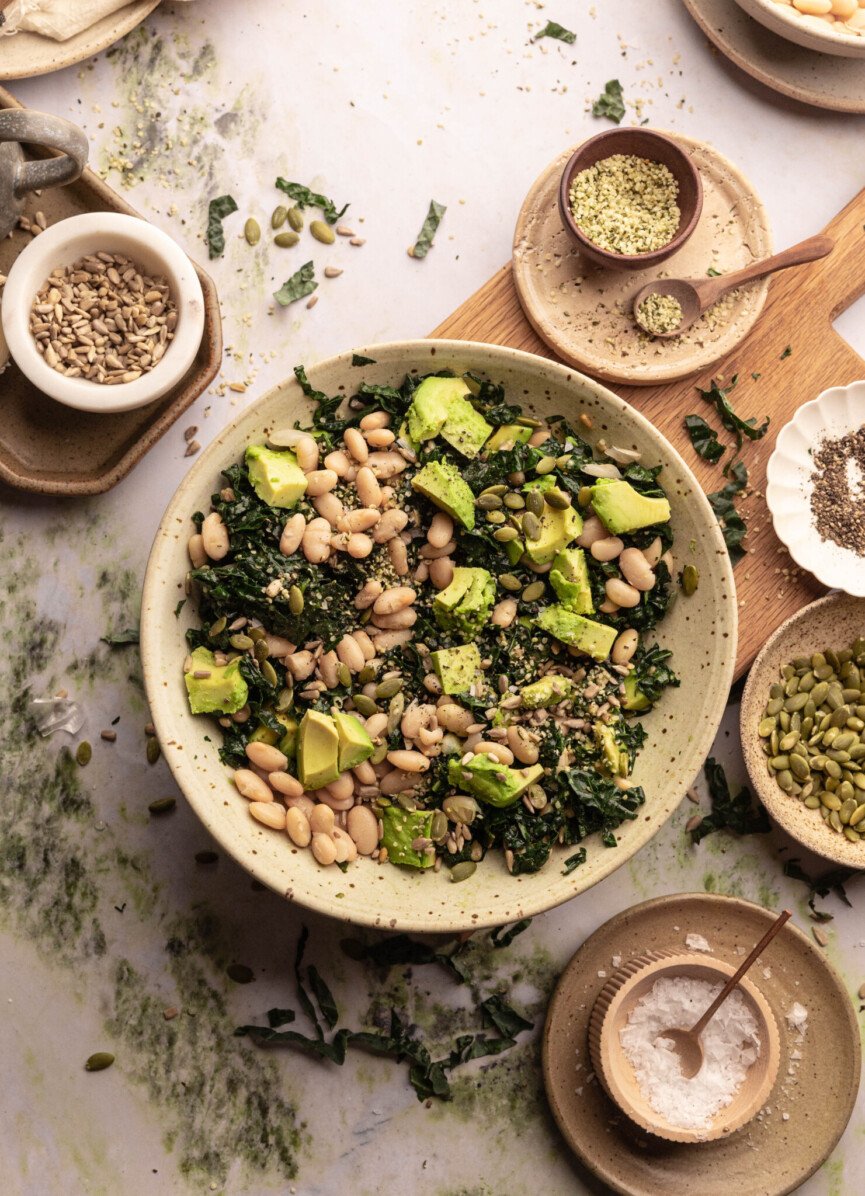Protein has officially entered the chat. As more women prioritize their health, it’s clear that this macronutrient is key to feeling strong, balanced, and energized. But with so much conflicting advice out there, it’s easy to ask: How much protein do I need per day? Whether you’re aiming to support your hormones, build lean muscle, or simply feel full and satisfied after meals, understanding your protein needs is essential. Spoiler: You might need more than you think.
Armed with data, we’ll break down how to calculate protein needs, signs you may not be getting enough, and exactly how to get more of this powerhouse nutrient into your daily routine.
Featured image by Suruchi Avasthi.
- Why is protein so important for women?
- Will eating more protein make me bulky?
- How much protein do I need per day?
- How to Calculate Your Protein Needs
- Signs You Might Not Be Getting Enough Protein
- Not All Protein Sources Are Created Equal
- The Best High-Protein Foods to Eat
- How to Add More Protein to Your Day
- The Takeaway

Why is protein so important for women?
Despite its many health benefits, protein remains one of the most underrated and misunderstood nutrients in the average woman’s diet. In fact, studies show that many women aren’t getting enough protein to support their body’s needs. This is less than ideal, as protein does a whole lot more than help you feel full after a meal. It’s essential for:
- Building and maintaining lean muscle mass
- Supporting hormone balance
- Regulating blood sugar levels
- Reducing cravings
- Strengthening hair, skin, and nails
- Boosting metabolism and aiding weight loss
- Supporting bone density
Not to mention, it plays a critical role in tissue repair, immune function, and fertility. In short? If you’re not getting enough protein, your body feels it.
Will eating more protein make me bulky?
Let’s bust this common nutrition myth once and for all: Protein won’t make you bulky. Most women simply don’t produce enough testosterone to develop large muscles easily. To build a visibly muscular physique, you’d need intense weight training and a significant caloric surplus. Bulking up—or gaining significant muscle mass as a woman—requires much more than simply consuming protein and lifting weights. As mentioned, because of differences in female and male hormone levels, it’s much harder for women to gain large amounts of muscle mass. For the average woman, eating more protein will help you feel strong, toned, and energized—not bulky.

How much protein do I need per day?
As with most nutrition questions, this answer is nuanced. There isn’t a universal, one-size-fits-all protein formula. Your protein needs vary depending on your weight, activity level, and health goals. For most healthy adults, the recommended daily intake is approximately 0.8 grams of protein per kilogram of body weight—or around 0.36 grams per pound. This means that a sedentary woman weighing 150 pounds would require around 55 grams of protein per day. However, most experts agree, those numbers are far too low because it’s the minimum to avoid deficiency—not necessarily to thrive.
If you’re active, pregnant, trying to build muscle or support weight loss, most experts recommend 1.2 to 2.2 grams of protein per kilogram of body weight. For example, a female athlete or pregnant woman weighing 150 pounds may require up to 130-150 grams of protein per day.
Quick Reference Guide:
| Goal/Condition | Protein Needs |
|---|---|
| General health | 0.8 g/kg body weight |
| Active lifestyle | 1.2–1.6 g/kg |
| Muscle maintenance or fat loss | 1.6–2.2 g/kg |
| Pregnancy or postpartum | 1.2–2.0 g/kg |
How to Calculate Your Protein Needs
Based on your physique goals and circumstances, you can calculate how much protein you need with the formula below or use this macro calculator.
- Convert your weight to kilograms: Divide your weight in pounds by 2.2
- Multiply by your activity factor:
- Sedentary: 0.8–1.0 g/kg
- Moderate activity: 1.2–1.6 g/kg
- Very active/pregnant: 1.6–2.2 g/kg
From there, divide this total by the number of meals and snacks you typically eat in a day. For most, that averages out to about 20-30 grams of protein per meal. All of that said, work with a health coach, macro coach, or personal trainer for personalized protein recommendations.
Signs You Might Not Be Getting Enough Protein
So, how do you know if you’re getting enough protein? First and foremost, you feel satiated after eating, you’re recovering well from your workouts, and you don’t feel plagued by sugar cravings all day long. However, these are potential signs you’re not consuming adequate protein:
- You feel hungry all the time. Stating the obvious: Protein is fuel. It’s one of three sources of macronutrients, along with carbs and fats. Studies show that eating foods with protein helps you feel fuller for longer.
- You have brittle hair, skin, and nails. All of these are made up of proteins like elastin, collagen, and keratin. When your body can’t make them, you could have brittle or thinning hair, dry and flaky skin, and deep ridges on your fingernails.
- You feel fatigued or weak. Research shows that just seven days of not eating enough protein can affect the muscles responsible for your posture and movement—especially if you’re older than 55. Over time, a lack of protein can cause muscle mass loss, which in turn cuts your strength and slows your metabolism. Lack of protein can also lead to anemia (not enough oxygen to your cells will make you tired).
- Your mood is all over the place. Your brain uses neurotransmitters to relay information between cells. And many of these neurotransmitters are made of amino acids—the building blocks of protein. A lack of protein in your diet could mean your body can’t make enough of those neurotransmitters, leading to low levels of dopamine and serotonin.
Not All Protein Sources Are Created Equal
When it comes to measuring the nutritional value of a protein, we look at the quantity of essential amino acids it contains. Different foods contain different amounts of essential amino acids. Animal proteins (chicken, beef, fish, and dairy) have all nine essential amino acids. These are known as complete proteins. However, some plant foods also contain all nine essential amino acids: soy products, quinoa, amaranth, Ezekiel bread, spirulina, nutritional yeast, hemp seeds, and chia seeds.
Other plant proteins—like beans, lentils, and nuts—aren’t quite complete proteins (but are very close). Plant-based eaters require a varied diet to ensure all essential amino acids are present.
The Best High-Protein Foods to Eat
Not all proteins are created equal. Complete proteins contain all nine essential amino acids your body needs. Here’s how to get them:
Animal-Based Protein Sources (complete proteins):
- Chicken, turkey, and lean beef
- Eggs
- Greek yogurt and cottage cheese
- Fish and shellfish
Plant-Based Protein Sources:
Try our favorite high-protein vegetarian recipes or add these sources to your daily meals:
Complementary: Beans, lentils, nuts, seeds, whole grains (combine to ensure all essential amino acids)
Complete: Tofu, tempeh, edamame, quinoa, amaranth, chia seeds, hemp seeds, spirulina
How to Add More Protein to Your Day
So, how can you ensure you’re getting enough protein in your diet? The easiest way is to include a source of protein with each meal and snack. And it doesn’t have to be complicated—try one of these budget-friendly high-protein recipes. Or just start with small swaps:
- Breakfast: Eggs, cottage cheese, Greek yogurt, protein-rich smoothies with collagen or nut butters, or any of these high-protein breakfast recipes
- Lunch: Add grilled chicken, tuna, chickpeas, or tempeh to salads or grain bowls
- Dinner: Serve fish, steak, or tofu with veggies and a whole grain
- Snacks: Hard-boiled eggs, hummus and crackers, string cheese, or protein bars
You don’t need to overhaul your diet—just focus on building your meals around a solid protein source.
The Takeaway
When it comes to supporting your energy, strength, metabolism, and hormones, protein is non-negotiable. The good news? Hitting your daily protein needs doesn’t have to be hard—it just takes a little intention. Whether you’re looking to lose weight, build muscle, or feel your best as you age, the right protein intake can make all the difference.
The Recap:
- Aim for 20–30 grams of protein per meal
- Most women need 80–120 grams per day, depending on lifestyle and goals
- Protein supports hormones, metabolism, muscle, and mood
- Prioritize both complete and diverse protein sources
Now you’re ready to power your day, one protein-packed meal at a time.
Most women need between 80–120 grams of protein per day, depending on weight, activity level, and goals. The minimum RDA is 0.8 g/kg, but experts recommend 1.2–2.2 g/kg for optimal health.
Divide your body weight in pounds by 2.2 to convert to kilograms. Then multiply by 1.2–2.2 depending on your lifestyle (more active = more protein). Example: A 150-pound woman may need 82–109g/day.’
Top protein sources include eggs, Greek yogurt, fish, chicken, tofu, tempeh, lentils, beans, chia seeds, hemp seeds, and quinoa.re
Yes—aim for 20–30 grams of protein per meal to stay full, support muscle, and balance hormones. Don’t forget snacks, too! l
Absolutely. Protein supports satiety, boosts metabolism, and preserves lean muscle during weight loss, all of which make it easier to reach your goals
Yes—protein provides amino acids needed to produce and regulate key hormones, helping stabilize mood, energy, and menstrual cycles.
This post was last updated on June 11, 2025 to include new insights.







